News FY 2018
A Visit from Bhutan Royal University
On March 27 and 28, 2019, two faculty members from the Royal University of Bhutan (RUB) visited the headquarters of OUJ to carry out a research project based on the collaborative agreement between OUJ and RUB.
An overview of OUJ was given to the delegation on the morning of the 27th, and in the afternoon they made a presentation outlining the Kingdom of Bhutan, RUB, and its education systems. Vice President Ikeda attended the gathering and exchanged opinions with the visitors.
On the following day, the visitors toured the Chiba Study Center and the OUJ library, master control room, and TV studio. This was followed by a courtesy visit to President Kisugi and Vice President Iwanaga for a conversation about ongoing research and cooperation between the two universities.
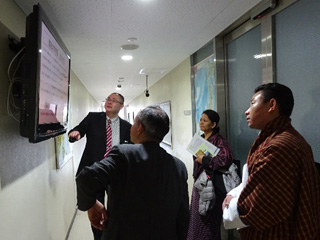
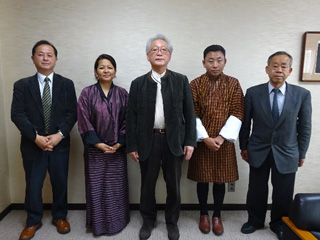
This visit is part of Professor Kawai's online course development research, and before the headquarters visit included a trip to the OUJ Gunma Study Center on March 26th, where the delegation spent productive time interacting with faculty and students. It is expected that the two universities will further develop their friendly relationship through substantial exchanges in the future.
A Visit from the School of Management Science at Sukhothai Thammathirat Open University in Thailand
On March 15, 22 faculty members visited OUJ from the School of Management Science at Sukhothai Thammathirat Open University (STOU) in Thailand, with which OUJ has a collaborative agreement. Communication between our two universities has been activated since OUJ sent a delegation to STOU in October last year, leading to this visit.
After receiving an overview of OUJ in the morning, the STOU delegation toured the Chiba Study Center and the OUJ library, master control room, and TV studio. The visitors observed each facility with great enthusiasm and posed a lot of questions to the staff guiding them.
In the afternoon, a presentation session attended by OUJ faculty and staff was held to outline research and other efforts by the two universities. Various questions were asked and opinions exchanged regarding education systems and services.
A discussion with President Kisugi and Vice President Iwanaga provided a forum for congenial exchange with STOU members. We hope that both universities will further develop their relationship, leading to substantial exchanges in the future.

President of Athabasca University Visits OUJ
Dr. Neil Fassina, President of Athabasca University (AU), accompanied by an Executive Committee member of the International Council for Open and Distance Education (ICDE), visited the OUJ Headquarters on February 25–26.
Located in Alberta, Canada, AU is the only Open University in the country, with more than 41,000 enrollments.
Ties between our two universities have been strengthened since the renewal of their collaborative agreement in October 2017, and this resulted in welcoming this visit by President Fassina.
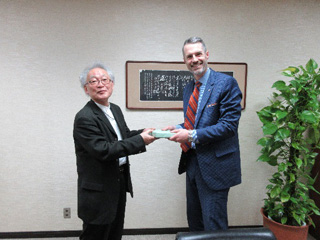
In the afternoon of the 25th, President Fassina toured the OUJ library, master control room, and TV studio after receiving an overview of OUJ. Subsequently he spoke with the OUJ President and Vice-President, and exchanged views and information on the current situation of open universities and distance education.
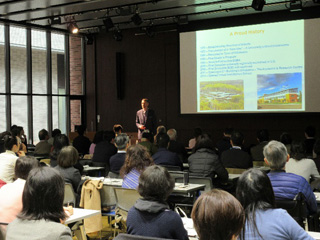
On the following day, President Fassina delivered a lecture at the Tokyo Bunkyo Study Center, moderated by Director Hayashi of the Study Center with an audience of more than 70, mainly OUJ students.
His presentation, titled “Athabasca University: our past, present, future,” covered the history, education systems, and prospects of AU. It was followed by an active question-and-answer and opinion-exchange session. The event concluded with a closing address by Vice President Iwanaga.
It is expected that friendship between the two universities will deepen, and that substantial human and information exchanges will be made in the future.
ICDE Lillehammer Lifelong Learning Summit
From February 11 to 13, 2019, the ICDE Lillehammer Lifelong Learning Summit was held jointly by the International Council for Open and Distance Education (ICDE) and the Inland Norwegian University of Applied Sciences (INN) in Lillehammer. There were about 400 participants from 40 mainly European countries. Lillehammer hosted the 1994 Winter Olympics and gives the impression of a quiet, snowy town with many slopes. Scandic hotel, the summit venue, is located within walking distance of the ski jumping base. Professor Masahiro Kumabe, Professor Kumiko Iwasaki, and Deputy Head of the General Affairs Section, Mr. Kenjiro Jin, participated from OUJ.
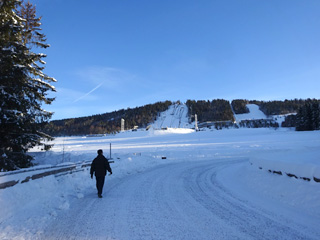
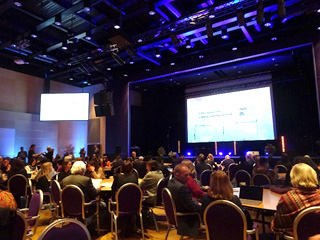
This was the first ICDE international conference to raise the theme of lifelong learning in Scandinavia, which is known as the birthplace of recurrent education. At the summit, a wide range of sub-topics was explored, focusing on lifelong learning at three levels: global trends, supply and demand, and educators and learners. On the second day, Prime Minister Solberg of Norway gave a lecture showing the positive attitude toward lifelong education in her country.
Three participants from OUJ gave talks at breakout sessions. Professor Kumabe described the characteristics of mathematics education at OUJ from the viewpoint of lifelong education, giving some examples with the theme "Effective mathematics education in the Open University of Japan."
Professor Iwasaki’s talk was titled "The reemergence of recurrent education in Japan" and described how the concept of "recurrent education" was once again being noticed in Japan and taken up as policy response to changes in the employment environment accompanying globalization, the declining birthrate, and an aging population.
Mr. Jin gave a presentation titled "Designing a 100-year life society: recurrent education by the Open University of Japan (OUJ)," highlighting examples of social roles and contribution by elderly people as part of creating a society where everyone can be active. He outlined the government’s basic ideas relating to human resource development and described how OUJ supports acquisition and renewal of professional qualifications.
Open Education Leadership Summit 2018
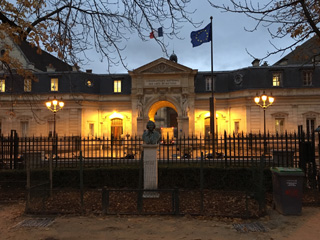
Hosted by the Conservatoire national des arts et métiers (Le CNAM), the Open Education Leadership Summit 2018 was held in Paris, France on December 3–4, 2018, with the theme “Achieve More through Collaboration.” Vice President Masaya Iwanaga and Professor Kumiko Iwasaki of Psychology and Education attended from OUJ, joining about 200 leader- level representatives from 50 countries around the world.
This summit was also organized and supported by the Open Education Consortium, a key worldwide network in the field of open education, and the International Council for Open and Distance Education (ICDE).
The summit consisted of two types of parallel sessions, open discussions and workshops, and attendees could participate in either type of session flexibly according to their interests.
The discussions focusing on open education explored various kinds of openness, such as open educational resources, MOOCs, open access, open science, open data, and open source software and hardware. Other discussions were titled “Open education certification,” “Education commons,” “Open education and Sustainable Development Goals (SDGs) by the United Nations,” and “The point of view from developing countries.” At the workshops, participants were divided into groups by themes or regions to create roadmaps representing their own open education initiatives, and on the last day of the summit each group made a concrete proposal based on its efforts.
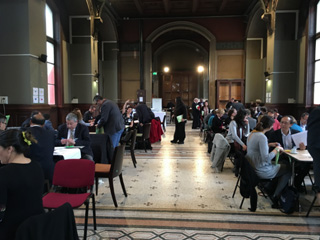
Attendance at this summit reaffirmed that open education has possibilities for reducing disparities in education, and a sustainable mechanism based on the international network to assure everyone of access to open education is now being explored. Considering the social significance of open education, the experience at this summit was highly valuable.
OUJ Delegation Visits Sukhothai Thammathirat Open University (STOU)
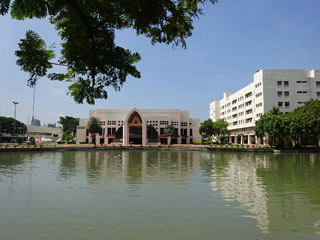
From October 29 to 31, 2018, an OUJ delegation consisting of Professor Makiko Miwa and Associate Professor Yasuhiko Tsuji of Informatics, as well as Mr. Kenjiro Jin, Head of the International Affairs Section, visited STOU to study its learning systems.
STOU was established in 1978 as the 11th public university in Thailand and now has about 64,000 students enrolled. It broadcasts lectures for undergraduate and graduate students via its own TV and radio channels as well as the internet. OUJ concluded a collaborative agreement with STOU in 2012, and ties between our two institutions have been strengthened since then.
The OUJ delegation arrived at STOU Headquarters in Nonthaburi Province, north of Bangkok, on October 29. Acting Vice President Krisana Rungrojwanich and Acting Vice President Somporn Puttapithakporn warmly welcomed the delegation. This was followed by a presentation outlining STOU, which showed that a decrease in enrollments caused by social changes and the proliferation of universities was beginning to cast a shadow over STOU operations.
The OUJ delegation was invited to a welcome lunch and spent valuable time deepening friendships via pleasant conversation with STOU members. The party then visited each department in the headquarters, including a tour of the studio, and was briefed on support systems for faculty members’ research and other university operations.
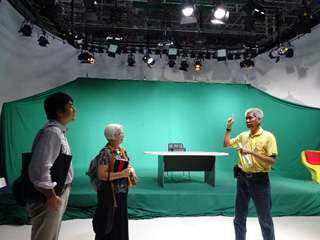
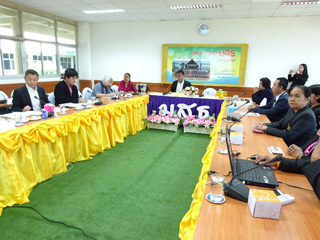
On the morning of October 30, three OUJ members visited the Regional Distance Education Center located in Nakhon Nayok Province northeast of Nonthaburi Province. Regional Distance Education Centers deployed in ten locations across Thailand operate similarly to OUJ’s study centers.
Upon arrival, the delegation was welcomed by the director and faculty members and was briefed on the center, followed by a facility tour and opinion exchanges. A local student who belongs to the students’ club joined the gathering, and valuable information was shared with him.
On October 31, the party returned to STOU headquarters and heard more about lifelong learning programs for general citizens, printed material production processes, and support for students with disabilities. The delegation then made a courtesy visit to Acting President Prasart Suebka and exchanged views with him to maintain the friendly relationship between the two universities. Chairman of the University Council Wichit Srisa-an (Primary President of STOU) heard about the OUJ visit and called on the delegation unexpectedly. The OUJ party outlined OUJ’s current situation for him and engaged in lively communication.
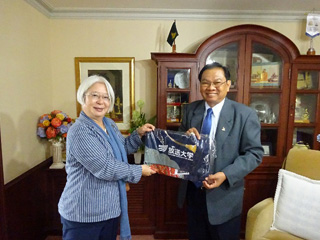
Throughout the three-day visit, the OUJ delegation received a warm welcome from everyone at STOU. Most of all, OUJ would like to send our special thanks to the staff of the International Affairs Office, who treated our delegation with consideration and made flexible arrangements. We hope that both our universities continue to grow together through substantial exchanges and cooperation in the years ahead.
32nd AAOU Annual Conference in Hanoi, Vietnam
The 32nd Annual Conference of the Asian Association of Open Universities (AAOU) was hosted by Hanoi Open University at the Melia Hanoi Hotel in Hanoi, Vietnam, on October 24–26, 2018. The main theme this year was “Open Education in Human Resource Development in Asia’s Period of Integration.”
About 250 university officials and educational experts in the field of open and distance learning from 15 countries participated in the conference.
From OUJ, President Shin Kisugi and Vice President Masaya Iwanaga attended the AAOU Executive Committee Meeting, and papers were presented by Professor Makiko Miwa, Professor Tsuneo Yamada, Associate Professor Yasuhiko Tsuji, and Mr. Kenjiro Jin, Deputy Head of the General Affairs Division. Professor Yamada, a member of the Steering Committee of Asian MOOCs, also attended the Committee meeting.
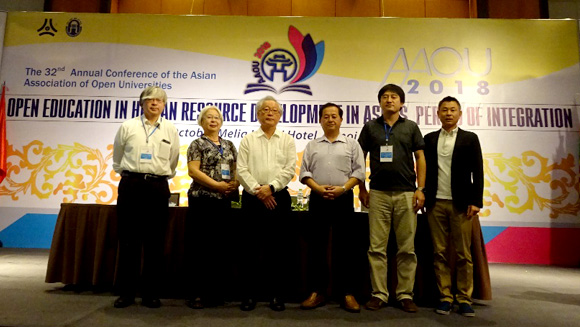
Participants from OUJ
Keynote speeches discussed how to utilize technologies in distance education in terms of human resource development and vocational education, and how to carry out such development and education in open universities in Asia. Other sessions outlined challenges and practices in education for nursing and agricultural occupations, as well as foreign languages.
Professor Miwa made a presentation titled “Expanding the market to include recurrent education: The case of a data science lecture series.” This talk addressed the challenge of how OUJ can expand the market for recurrent education in Japan, where the rate of students aged over 25 enrolled in higher education is rather low compared to other developed countries.
Professor Yamada delivered a presentation titled "Learning analytics: technical and operational requirements for implementation," describing challenges in the field of learning analytics at OUJ. A paper titled "Crowdsourced learning based on a learning economy," co-authored by Professor Yamada, was awarded a silver medal in the AAOU Best Paper Awards.
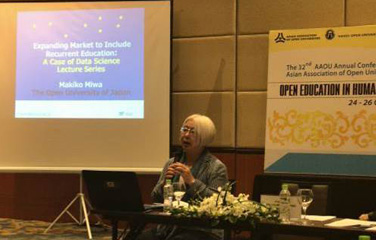
Professor Miwa delivers her presentation
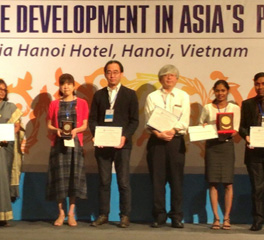
Professor Yamada at the award ceremony
Associate Professor Tsuji gave a speech titled “A survey on university students' learning from each other at all study centers nationwide at the Open University of Japan,” describing outcomes from the survey.
Mr. Jin’s talk was titled “Qualification acquisition in OUJ: being in line with national politics,” and explained the background and current situation of qualifications in the fields of psychology, nursing, and school teaching in Japan. He also outlined OUJ’s roles and challenges in support of qualification acquisition and renewal.
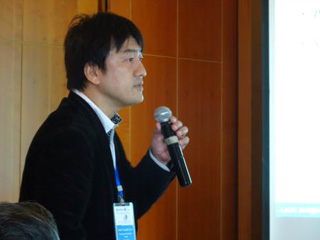
Associate Professor Tsuji at the microphone
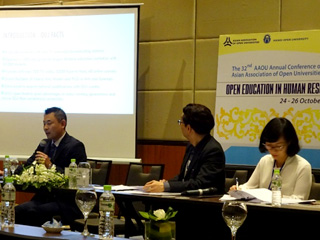
Mr. Jin makes his presentation
The staff of Hanoi Open University brimmed with warm hospitality. Their spirit of welcome was clear to conference participants on the decorated stage of the main hall, where a demonstration of traditional percussion instruments was performed at the opening and water puppetry featured during dinner. The conference concluded with a presentation by the Virtual University of Pakistan, the host of the 33rd AAOU annual conference to be held in Lahore, Pakistan, on November 13–15, 2019.
Delegation from Shanghai Open University
On October 29, 2018, a delegation consisting of five members of Shanghai Open University (SOU) including Vice President Wang visited OUJ, accompanied by Dr. Makino of Tokyo University and two of his graduate school students. The purpose of their visit was to increase exchanges between the two institutions.
SOU is a new type of higher education institution organized by the Shanghai People’s Government, authorized by the Department of Education, and controlled by the Shanghai City Board of Education. Since its establishment as Shanghai TV University in 1960, it has been closed, reopened, and renamed. It focuses on education customized for adult learners and presently has 46 major fields of study and about 70,000 students enrolled.
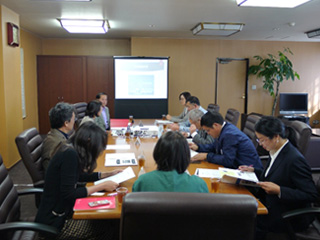
After the visitors arrived, Professor Ming Li of the School of Society and Industry presented an outline of OUJ, followed by a tour of the library, master control room, and TV studio.
President Kisugi and Vice President Iwanaga joined the welcome lunch meeting and exchanged information on various topics in a friendly atmosphere.
The visit from SOU was a good opportunity for both institutions, and there are high expectations of a closer relationship in the near future.
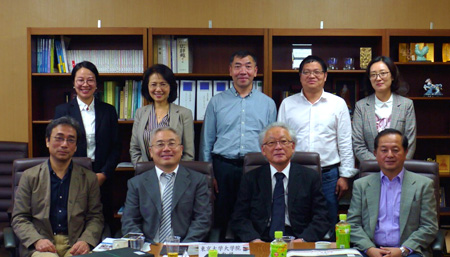
8th OUC-KNOU-OUJ International Seminar Held at OUC in Beijing
On September 19–21, 2018, the 8th OUC-KNOU-OUJ International Seminar was held at the headquarters of the Open University of China (OUC) in Beijing. This seminar has been held in turn by OUC, Korea National Open University (KNOU), and OUJ since 2009.
The main theme of the seminar was “Online Teaching Development and Open University Innovation,” and two delegates from each university delivered lectures, totaling six speakers. OUJ President Shin Kisugi made a speech at the opening ceremony affirming the positive effects this three-party seminar has brought about.
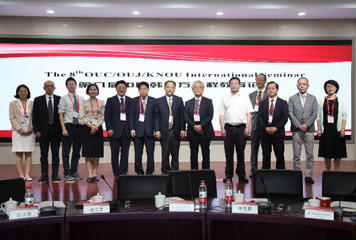
Seminar participants
In the first session, Professor Takiura delivered a speech titled “Potential of teaching a substantial writing component in a distance education university.” In the talk, he outlined his challenges in online lectures where he acts as the lead lecturer, and where students can learn how to write objectively, being provided with opportunities to submit writing assignments and receive feedback from writing tutors.
In the second session, Professor Kazuhiro Kato spoke on “The role of simulation programs in online ecological study courses.” In his speech, he described his challenges in developing courses including field surveys, which are hard to replace with online programs. He outlined the example of a “field exercise in ecology” that uses simulation programs to partly substitute for a field exercise.
After the talks, other speakers and audience members asked many questions.
All participants in the three-party seminar shared information about online teaching and each university’s management concept, and also deepened mutual understanding, working relationships, and friendships.
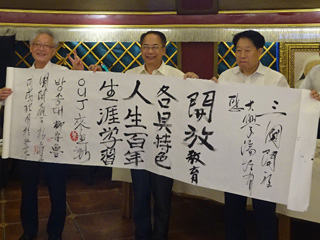
With OUC President (center) and KNOU President (right)
2018 OUJ International Symposium
On September 8, 2018, OUJ held an international symposium at the Tokyo Bunkyo Study Center. The theme of the symposium was “A New Era of OUJ: Challenges of Data/Evidence-based Education and Management.” It was attended by about 80 participants including OUJ students, graduates, and members of the public.
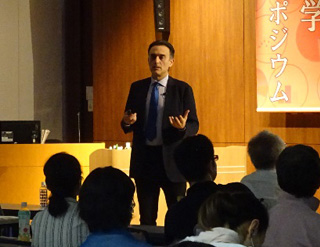
In the first session, Dr. Abelardo Pardo delivered a lecture titled “From data to tangible actions in digital education.” He outlined his challenges in data-based teaching and described how institutions can extend the use of data to areas such as personalised tutoring, promoting student engagement, and curriculum structure. This was followd by lively questions from the audience.
In the second session, Dr. Li Kam Cheong delivered a speech titled “Innovation in education: disruption, opportunities, and challenges.” His speech discussed the opportunities and challenges ushered in by technology-mediated education, and examined how technologies have revolutionized learning modes, materials, and space. This was again followed by lively questions from the participants.
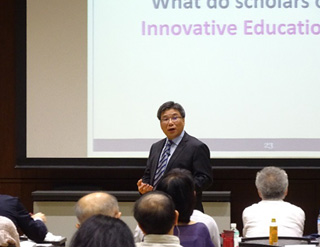
In the final session, Vice President Masaya Iwanaga served as moderator for a discussion with the two keynote speakers. Several topics were discussed by posing questions on matters such as the importance of sharing students’ goals with tutors in order to adapt to diverse students, how to balance traditional education typified by face-to-face classes and innovative education, and visions for data analysis and how it will be utilized in the future. The opinions and suggestions offered by the two speakers based on their rich experience were very practical and informative. OUJ plans to continue holding international symposiums.
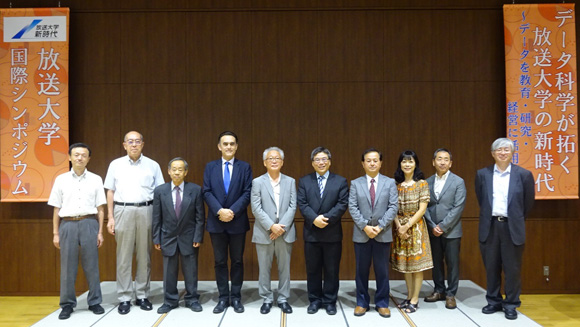
Visit from Korea National Open University (KNOU)
On June 22, nineteen students and graduates of KNOU led by Professor Lee Kyung Soo visited the headquarters of OUJ. All of the visitors are members of the Korea-Japan Cultural Exchange Association, where Professor Lee acts as a mentor. The association has long maintained a good relationship with the Korean Language Association of OUJ’s Kanagawa Study Center.
After arriving, the party received an outline of OUJ, followed by a tour of the library, master control room, and studio.
In an exchange meeting with OUJ faculty and staff, Vice President Iwanaga made the opening address and the visitors from KNOU introduced themselves in Japanese. The KNOU visitors and an OUJ student also presented a performance on violin, harmonica and clarinet.
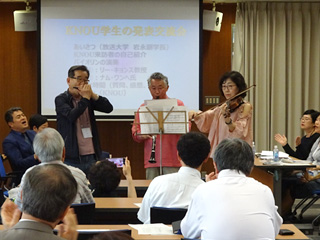
Professor Lee then made a presentation outlining KNOU, followed by a speech by Ms. Nam Eun Hee describing how hard she had pursued her studies of Japanese language and culture at KNOU. She mentioned that she first happened to start studying Japanese just as a hobby when turning sixty, and now she is still diligently using her Japanese skills as a volunteer for Japanese people who wish to learn Korean.
President Kisugi and Vice President Ikeda joined the exchange meeting for friendly conversations with KNOU members in a harmonious atmosphere.
On the following day, the delegation visited the OUJ Kanagawa Study Center and participated in exchange events, spending fruitful time with OUJ students.
We hope this visit to OUJ was a good experience for the visitors, and that the friendly relationship between our two universities will continue in future.
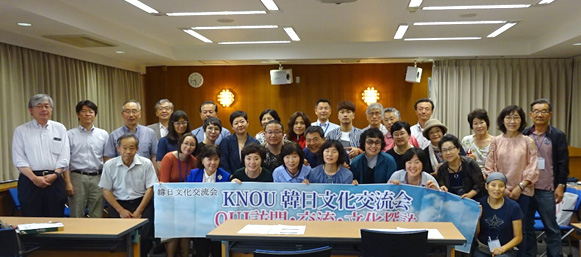
Delegation from Federal University of Mato Grosso in Brazil
On April 6, 2018, a delegation consisting of five researchers from the Federal University of Mato Grosso (UFMT), accompanied by Professor Onuki of Tokai University, visited OUJ to exchange views on future collaboration between UFMT and OUJ.
UFMT is a federal university established in 1970 in Cuiabá, Brazil. It has been developing teacher training courses through distance education domestically, and from 2009 to 2013, the university conducted a Bachelor of Education Licensing Course for Brazilians in Japan jointly with Tokai University. In April this year, an online course was also launched to offer multicultural education in Portuguese, English, and Japanese, and Professor Inamura and Professor Nara of OUJ are taking part in this collaborative project with Tokai University.
In the morning, Mr. Jin, Head of the International Affairs Section, provided an outline of OUJ. This was followed by information exchange between the two institutions, with various questions from the delegation regarding OUJ’s learning systems and student trends at OUJ, including occupations and age distribution.
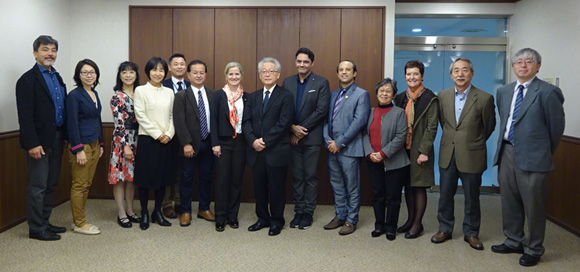
Afterwards, President Kisugi welcomed the delegation at a luncheon meeting, where lively conversation took place around the table. The delegation then toured the Chiba Study Center, TV studio, and master control room, showing particular interest in the equipment in the TV studio and sub control room, and taking a lot of photos.
At the subsequent gathering, Professor Anjos outlined UFMT to President Kisugi and Vice President Iwanaga, followed by discussion of possibilities for future collaboration between the two institutions.
This visit is expected to open up opportunities for closer relations between the two universities.




